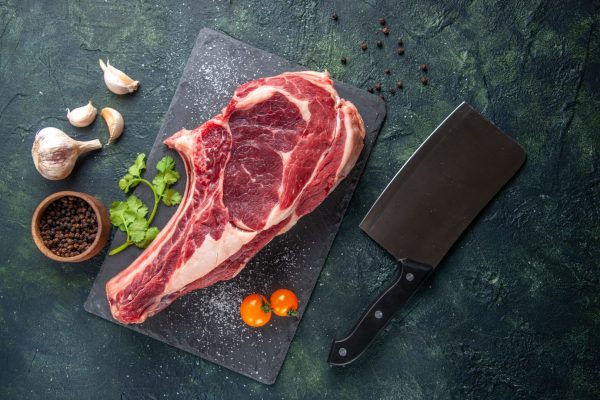I admit that I love a juicy steak or braised short ribs as much as anyone else. But there’s a big difference between enjoying meat in moderation and relying on it as the centerpiece of every meal.
What concerns me the most is commercially raised meat. That’s the meat that comes from animals raised on GMO feed, pumped full of antibiotics, and injected with hormones.
Genetically altered feed: Some studies suggest fragments of DNA from GMO feed may enter the human bloodstream, and the results could be devastating.
Antibiotics: About 80% of antibiotics in the U.S. are given to healthy livestock. Eating that meat may wipe out your “good” gut bacteria, fueling obesity and inflammatory disorders, while also promoting antibiotic resistance.
Hormones: Steroid hormones given to animals for faster growth can act the same way in your body, contributing to weight gain and other health issues.
That’s why I recommend that you always choose grass-fed, pasture-raised, or wild-caught animal proteins.
🥩How Much Meat Should You Eat?
Can you enjoy a rib-eye roast every now and then? Sure!
Is it okay to chomp down on a half rack of baby-back beef ribs on occasion? Of course it is! This is especially true if you’re investing in clean meats that aren’t loaded up with toxic substances.
Still, I advise you to keep your intake of animal proteins to about 15% of your diet. That’s because eating too much of them can upset the delicate balance of bacteria in your gut.
In just a single day, an animal-based diet can cause the bacteria linked to inflammatory bowel disease to flourish. In four days, it increases the type of about 21 other types of bacteria. And not all of them are good for you.
In fact, an imbalanced gut microbiota plays a very big role when it comes to inflammatory factors, heart disease, diabetes, stroke and, as I mentioned previously, obesity.
Plus, the way you cook your meat matters a lot. It’s most flavorful when it’s seared, broiled, grilled or charred.
Unfortunately, all of these cooking techniques release substances linked to many types of cancer; including cancers of the breast, prostate, colon, pancreas and stomach. This is true even if you’re buying the cleanest and most natural meat you can find.
So yes, eating too much meat does have its downfall. But I do have a few tricks to help you cut down on your meat intake without feeling deprived.
✂️6 Ways to Slash Your Meat Intake without Sacrifice
Change your view of what makes a meal. If you grew up like I did the main focus of your meals is probably a big cut of meat. Vegetables are the side dishes. So switch things up. Make veggies the star of your meals and add a little meat instead of the other way around. This automatically puts meat in the back seat.
Observe meatless Mondays. This practice is global movement to help people reduce meat intake. And it’s only for one day, which makes it pretty easy to accomplish. If it works for you, try going meatless on Wednesdays and Fridays, too.
Aim for one or two meatless meals a day. If you’re a dedicated meat-lover, this concept makes cutting back on meat an easier concept to stomach. After all, if you know you can have a steak at dinner, it’s much easier to have a salad at lunch.
Go international. Check out Indian, Mediterranean and Asian recipes that are vegetable based and loaded with herbs and spices. When your meals are bursting with flavor, it’s easy to forget that there’s no meat in them.
Eat only the healthiest of animal proteins. Whenever you have a choice, choose grassfed meat and pasture-raised poultry over processed meats like bacon, ham and sausage. Better yet, select wild-caught fish over all other animal proteins.
Modify the way you cook your meats. If you marinate meat before cooking – and if you cook it in liquid at low temperatures – it cuts down on the release of risky cancer-promoting compounds.
Ultimately, you don’t have to cut out meat completely. Just eat it mindfully, choose the cleanest sources, and let vegetables take center stage!
SOURCES:
Spisák S, Solymosi N, Ittzés P, Bodor A, Kondor D, Vattay G, Barták BK, Sipos F, Galamb O, Tulassay Z, Szállási Z, Rasmussen S, Sicheritz-Ponten T, Brunak S, Molnár B, Csabai I. Complete genes may pass from food to human blood. PLoS One. 2013 Jul 30;8(7):e69805.
Shen C, Yin XC, Jiao BY. et al. Evaluation of adverse effects/events of genetically modified food consumption: a systematic review of animal and human studies. Environ Sci Eur. 2022;34(8).
Martin MJ, Thottathil SE, Newman TB. Antibiotics Overuse in Animal Agriculture: A Call to Action for Health Care Providers. Am J Public Health. 2015 Dec;105(12):2409-10.
Ghimpețeanu OM, Pogurschi EN, Popa DC, Dragomir N, Drăgotoiu T, Mihai OD, Petcu CD. Antibiotic Use in Livestock and Residues in Food-A Public Health Threat: A Review. Foods. 2022 May 16;11(10):1430.
Lee C, Lee J, Eor JY, Kwak MJ, Huh CS, Kim Y. Effect of Consumption of Animal Products on the Gut Microbiome Composition and Gut Health. Food Sci Anim Resour. 2023 Sep;43(5):723-750.
David L. Maurice C, Carmody R, et al. Diet rapidly and reproducibly alters the human gut microbiome. Nature. 2014;505:559–563.



